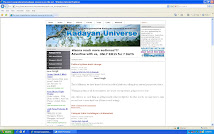The Taylors’ Guinness World Record challenge will provide comprehensive insights for a fuel efficiency programme which Shell is promoting called “FuelStretch.” This programme is designed to help everyday motorists cut the cost of motoring through a mix of enhanced fuel technology and education in fuel-efficient driving techniques. So, when the Taylors leave London, they’ll be conscious that fuel-saving their way across the planet will mean they need to adhere to the following principles:
1. Drive smoothly - Aggressive driving can use as much as a third more fuel than safe driving*. Avoid accelerating or braking too hard and try to keep your steering as smooth as possible.
2. Use higher gears - The higher gear you drive in the lower your engine speed is, which can improve fuel efficiency. So change up a gear whenever you can, without labouring the engine.
3. Tune and service your engine - A well tuned engine can improve fuel economy by up to 4%**, so change your oil and follow your car manufacturer’s recommendation on servicing.
4. Keep your tyres at the right pressure – Correctly inflated tyres are safer and last longer. A tyre that is under inflated by just 1psi can reduce fuel efficiency by as much as 3%**. An under or over inflated tyre is also more susceptible to failing.
5. Avoid carrying excess weight – For every extra 100 lbs (45 kg) you carry your fuel efficiency can drop by 1-2%*. So keep your boot or back seat clear of unnecessary items that just add weight to your vehicle.
6. Keep the windows closed - Wind blowing through an open window will slow you down. To compensate, you may put your foot down harder, using more fuel.
7. Take the roof rack off - If you’re not using your roof rack then remove it. They affect the aerodynamic efficiency of your vehicle and create drag, reducing fuel economy by as much as 5%*.
8. Use the correct oil - Always use the recommended grade of motor oil. Using the manufacturer’s recommended lubricant can improve fuel efficiency by 1-2%**. Higher quality motor oils can also help your engine operate more efficiently.
9. Fuel Matters – All fuels are not created equal. Fuel economy is maximised in the engine through a combination of good driving habits and using the best fuel…one that helps reduce friction and improve cleanliness in the engine, thereby boosting fuel efficiency. The Taylors have chosen Shell fuel to power their world record attempt as a result of their own personal tests of several commercially-available fuels and their belief in Shell’s product quality and 50-year heritage of innovative fuels research and development.
10. Use cruise control - Using cruise control on major roads helps you maintain a constant speed and, in many cases, will improve fuel consumption.
11. Avoid excess idling - Idling gets you nowhere but still burns fuel. Turn the engine off when you’re in a queue, or waiting for someone, until you need it.
12. Plan trips carefully - Cutting down on the time spent in the car is the easiest way to conserve fuel. To reduce driving time, combine all your short trips and errands into a single journey.
13. Avoid over revving - Change gear in good time when you pull away or when you’re accelerating. Never ‘redline’ the rev counter.
14. Avoid high speeds - The faster you go the more wind resistance you’ll encounter and the more fuel your vehicle will consume just to maintain speed. Driving just 5mph over the speed limit can affect fuel economy by up to 23%***.
15. Keep your distance - Leave a sensible distance between yourself and the car ahead to give you ample time to brake evenly.
16. Use air conditioning sparingly – Air conditioning puts added strain on the engine and uses fuel to operate, so limit use to particularly hot or cold days. On temperate days use the fan instead.
17. Check the air filters - Air filters keep impurities from damaging your engine. Replacing a clogged air filter can improve fuel economy by as much as 10%** and will help protect your engine.
18. Avoid rush hour - If you can travel outside of peak times, you’ll spend less time stuck in traffic and consume less fuel as a result.
19. Conserve momentum - Think ahead when you’re driving. For example, slow down early to let traffic lights change, rather than stopping completely, or speed up a little before you reach the foot of a hill.
20. Avoid small fuel fills – Fuel evaporates every time you open the fuel cap. To stop this, avoid repeatedly topping up your tank. Also check the seal on your fuel cap is airtight.
It might sound like an awful lot to keep in mind: but once these tips are absorbed into drivers’ everyday approach to motoring and maintenance, they become second nature. What also becomes second nature is the knowledge that trips to the forecourt will become less frequent, which – in these days of rising costs – has to be a major benefit for each and every driver on the road.
*Estimates for fuel savings from sensible driving are based on studies and literature reviews performed by Energy and Environmental Analysis, Inc., Washington, DC.
**Estimates for fuel savings from vehicle maintenance, keeping tyres properly inflated, and using the recommended grade of motor oil are based on studies and literature reviews performed by Energy and Environmental Analysis, Inc., Washington, DC. Assumes fuel price of $3.07 per gallon.
***Estimates for the effect of speed on MPG are based on a study by West, B.H., R.N. McGill, J.W. Hodgson, S.S. Sluder, and D.E. Smith, Development and Verification of Light-Duty Modal Emissions and Fuel Consumption Values for Traffic Models, Oak Ridge National Laboratory, Oak Ridge, Tennessee, March 1999. Assumes fuel price of $3.07 cpg.
Source : Autoworld
Thursday, June 19, 2008
Subscribe to:
Post Comments (Atom)



























No comments:
Post a Comment